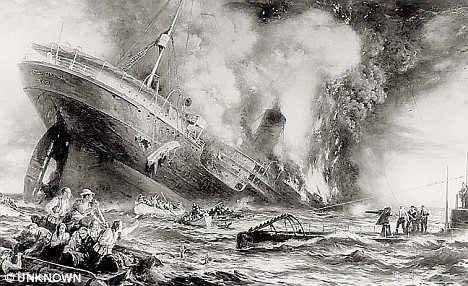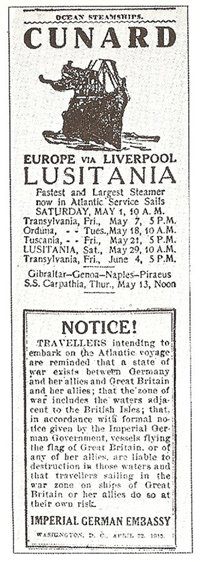
May 7, 1915, was a sunny afternoon. The British passenger liner Lusitania steamed just off the coast of Ireland carrying nearly 1,959 passengers and crew on its journey from New York City to Liverpool, England. At around 2:15 in the afternoon, a single torpedo struck the ship’s hull just below the water line. The explosion that followed sent the ship listing to starboard. Crew members herded women and children into life boats, while those that remained on board clutched the railing to keep from sliding across the deck and into the sea in Titanic-esque fashion. The ship’s severe list made most of the life boats inaccessible, while others became hopelessly tangled in their moorings and capsized before reaching the water. Some desperate passengers strapped life belts around their waists and threw themselves overboard. The Lusitania sank in 18 minutes, taking nearly two thirds of the passengers and crew with her.
Americans and British were outraged by Germany’s attack on a passenger liner and the resulting civilian deaths. American newspaper headlines called the attack a “massacre” and labeled it “villainous,” “barbaric” and “ghastly.” However, few Americans and fewer Congressmen thought the attacks warranted a military response–just one senator and three congressmen argued for war against Germany. Instead, the U.S. government, in a letter from President Woodrow Wilson to German Foreign Minister Gottlieb von Jagow, demanded an apology and reparations for each of the 124 American victims. President Wilson also asked Germany to promise not to attack passenger liners in the future.
Germany, however, claimed the sinking of the Lusitania was justified because it had been carried out according to the accepted international rules governing the taking of vessels on the seas during war, or the Cruiser Rules. The Cruiser Rules are as follows:

The German U-boat U-20 fired upon the Lusitania while it traveled on the sea 11 miles off the coast of Queensland, Ireland. Germany had designated the seas around Great Britain a war zone in February 1915, meaning that it would seize or sink any merchant ships or naval vessels belonging to Great Britain or its allies that traveled in these waters in accordance with the Cruiser Rules. Although the Lusitania had been built as a passenger liner, the British Admiralty had re-classed it as an armed merchant cruiser at the start of the war. The German government argued the Lusitania was a threat, and could therefore be fired upon without warning, because it carried munitions that would eventually be used on the battlefield against German soldiers. Further, the British Admiralty had ordered its ships to fire upon or ram U-boats that attempted to seize them. Germany argued that these evasive actions by other British ships made the Lusitania an immediate threat to the submarine U-20.
Germany also refused to apologize for the loss of American lives. Though the U.S. was neutral and its ships were not the subject of Germany’s submarine warfare, the American passengers traveled on a British ship that was a legitimate target. The German Embassy in the U.S. tried to make this distinction clear to American citizens in a warning dated April 22, 1915, and published in 50 U.S. newspapers in the May 1 editions.
The Lusitania disaster quickly faded from public view in the U.S. Within two weeks, newspapers in Ohio and throughout the country replaced articles about the ship and its victims with stories of the fighting on the eastern front and long bread lines in Berlin, Germany. Many historians consider the event a turning point in modern warfare because it signaled the end of the “gentlemanly” war practices of the nineteenth century in which attempts were made to spare the lives of women and children. It marked the beginning of the era of total warfare in which whole nations were deemed enemy combatants and fair targets of military action.
After the U.S. entered the war in April 1917, the Lusitania returned to the spotlight. “Remember the Lusitania!” became a rallying cry for American soldiers and Liberty Loan drive sponsors to stir up anti-German sentiments and motivate support for the Allied war effort.
Do you think the sinking of the Lusitania was justified? Would you have advocated for war against Germany?